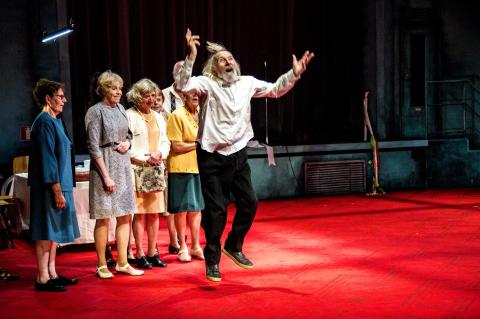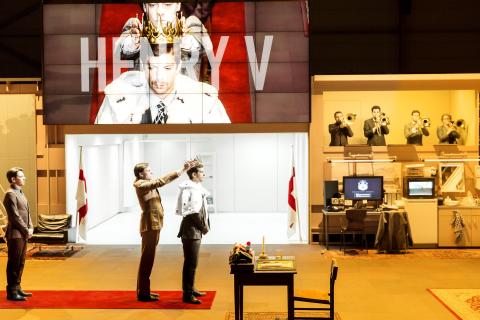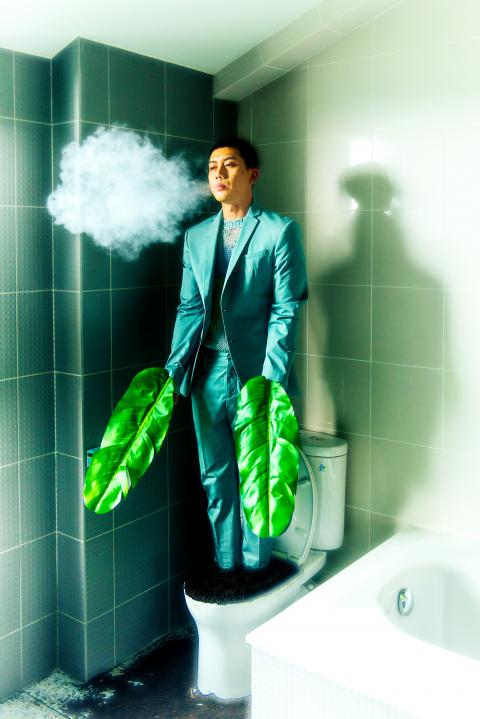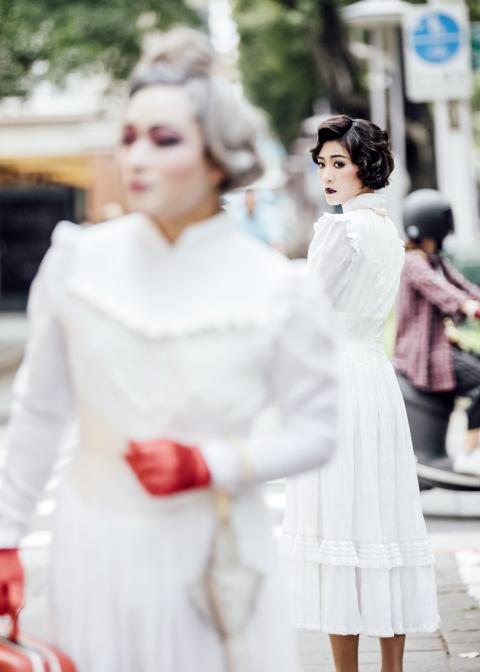Everyday life can be a struggle, whether on an individual level or nation-state, and many of the questions posed by the 10 productions in this year’s International Theatre Festival are ones that modern societies around the world are grappling with, even if the context of some of the plays is historical: aging populations, drug addition, eavesdropping, the scars of war and the quality of leadership.
The programmers at the National Theater Concert Hall (NTCH) say the game of life has become a battlefield, where security can be a trap, but art can be a weapon that can help audiences confront their realities.
The festival opens tomorrow with two shows, Vader (Father) by the Belgium-based Peeping Tom troupe on the main stage and The Nanyang Intelligence Bureau (南洋情報交換所) by Taiwan’s Oz Theatre Company (柳春春劇社) and Malaysian Au Sow-yee (區秀詒) upstairs in the Experimental Theater.

Photo courtesy of Oleg Degtiarov
Vader, which premiered in 2014, was the first of a family trilogy that includes 2016’s Moeder (Mother) and will finish up with next year’s production Kind (Child).
The play is set in the visiting room of a nursing home for the elderly, where the memories — or hallucinations — of an old man threaten to turn the realities of daily life into fantasy or nightmare, as the gap between perception and reality among the other residents and the home’s staff mirror the decay in the bodies and minds.
The show runs about 90 minutes, with no intermission, and will be performed in English, with Chinese surtitles.

Photo courtesy of Jan Versweyveld
The Nanyang Intelligence Bureau is the tale of a secret agent, crafted from excerpts of mythologies, historical texts, journals, novels, Malay poetry and other sources, a story that travels through time from the 1930s. Every movement could be a clue, every sound a code, as Au explores the relationship between physical body and movement.
The program, which will be performed in a variety of languages, with Chinese surtitles, is about 75 minutes long. It comes with an advisory that there will be strong lighting and sound effects.
Of the other eight programs in the festival, two are already sold out: The Ventriloquists Convention, written by Dennis Cooper and directed by French-Austrian artist Gisele Vienne, and The Dress (瑪莉皇后的禮服), a story inspired by the biographies of Japanese “comfort women,” by NTCH artist-in-residence, Inred Liang (梁允睿), and the Red Theatre Group (紅潮劇集).

Photo courtesy of Chen Yi-tang
God Knows (神農氏), a 120-minute long exploration of the pain of life and drug addiction by playwright Birdy Fong (馮勃棣) and Baboo, the director-in-residence of Shakespeare’s Wild Sisters Group (莎士比亞的妹妹們的劇團), will take to the main stage for three shows starting on Oct. 12.
The same weekend will see Later (再約), a production by Our Theater (阮劇團) and Lee Ming-chen (李銘宸) at the Experimental Theater.
Written by Chen Hung-yang (陳弘洋), Later grew out of Our Theatre’s “The Farm of Plays” project in 2015. It examines relationships in today’s world, where television, the Internet and social media battle for our attention.

Photo courtesy of National Theater Concert Hall
On Nov. 2 the NTCH’s flagship production of Theodoros Terzopoulos’ Yerma opens on the main stage.
This show is Terzopoulos second international collaboration on Spanish author and playwright Federico Garcia Lorca’s 1934 play about a woman who cannot conceive and how that defines her life and the choices she makes.
Yerma, along with Blood Wedding and The House of Bernarda Alba, make up Lorca’s trilogy about women’s struggles with life and death.
Terzopoulos trained the cast of 23 Taiwanese actors in his physical and vocal methods. Flamenco dancer Lin Keng (林耕), the Ten Drum Art Percussion Group (十鼓擊樂團) and guitarist Sergio Munoz will also perform.
Nov. 16 brings Children of the Ocean (海的孩子們) in the Experimental Theater, a coming of age tale set during the Battle of Okinawa during World War II by Korean-Japanese playwright Chong Wishing (鄭義信), cofounder of the Shinjuku Ryozanpaku Company.
While tickets are being sold, there are no seats for In The Solitude of Cotton Fields, which opens on Nov. 22.
French playwright Bernard-Marie Koltes’s 1987 philosophical classic is a dialogue between a drug dealer and client. Directed by Roland Auzet and staring Hsu Yen-ling (徐堰鈴) and Angie Wang (王安琪), the production will require audience members to wear headphones and follow the actress around the National Theater’s terrace.
The festival will close out with Belgian director Ivo van Hove and the Internationaal Theater Amsterdam’s production of Kings of War, a study in political leadership and charisma drawn from William Shakespeare’s Henry V, Henry VI and Richard III, set in a more modern-day “war room” inspired by that of then-British prime minister Winston Churchill during World War II.
The show, which opens on Nov. 29, marks the third visit by Van Hove and his company, following the very-well received Othello in November 2014 and The Fountainhead in May last year, although the troupe was then known as Toneelgroep Amsterdam (TGA).
TGA, the largest theater group in the Netherlands, on Jan. 1 this merged with the Amsterdam Stadsschouwburg, the city’s municipal theater where it has been the in-house troupe, and under the name Internationaal Theater Amsterdam.
The two-act Kings of War is a test of audience stamina, coming it at just about five hours, with a 20-minute intermission. It will be performed in Dutch, with Chinese surtitles.
To make it easier to buy tickets online, or at least check to see which shows have seats left, the artsticket.com.tw Web site has a dedicated International Theatre Festival page (www.artsticket.com.tw/CKSCC2005/Product/Product00/ProductsCategoriesPage.aspx?ProductsCategoryId=m40sIX3ugy7%2ftqLSyuaPTQ).
There are also several workshops and forum talks about the different productions and theater, including an hour-long guided tour to the stage of Internationaal Theater Amsterdam’s Kings of War on Nov. 30. More information and registration details are available from the National Theater.

June 23 to June 29 After capturing the walled city of Hsinchu on June 22, 1895, the Japanese hoped to quickly push south and seize control of Taiwan’s entire west coast — but their advance was stalled for more than a month. Not only did local Hakka fighters continue to cause them headaches, resistance forces even attempted to retake the city three times. “We had planned to occupy Anping (Tainan) and Takao (Kaohsiung) as soon as possible, but ever since we took Hsinchu, nearby bandits proclaiming to be ‘righteous people’ (義民) have been destroying train tracks and electrical cables, and gathering in villages

Swooping low over the banks of a Nile River tributary, an aid flight run by retired American military officers released a stream of food-stuffed sacks over a town emptied by fighting in South Sudan, a country wracked by conflict. Last week’s air drop was the latest in a controversial development — private contracting firms led by former US intelligence officers and military veterans delivering aid to some of the world’s deadliest conflict zones, in operations organized with governments that are combatants in the conflicts. The moves are roiling the global aid community, which warns of a more militarized, politicized and profit-seeking trend

The wide-screen spectacle of Formula One gets a gleaming, rip-roaring workout in Joseph Kosinski’s F1, a fine-tuned machine of a movie that, in its most riveting racing scenes, approaches a kind of high-speed splendor. Kosinski, who last endeavored to put moviegoers in the seat of a fighter jet in Top Gun: Maverick, has moved to the open cockpits of Formula One with much the same affection, if not outright need, for speed. A lot of the same team is back. Jerry Bruckheimer produces. Ehren Kruger, a co-writer on Maverick, takes sole credit here. Hans Zimmer, a co-composer previously, supplies the thumping

Dr. Y. Tony Yang, Associate Dean of Health Policy and Population Science at George Washington University, argued last week in a piece for the Taipei Times about former president Ma Ying-jeou (馬英九) leading a student delegation to the People’s Republic of China (PRC) that, “The real question is not whether Ma’s visit helps or hurts Taiwan — it is why Taiwan lacks a sophisticated, multi-track approach to one of the most complex geopolitical relationships in the world” (“Ma’s Visit, DPP’s Blind Spot,” June 18, page 8). Yang contends that the Democratic Progressive Party (DPP) has a blind spot: “By treating any